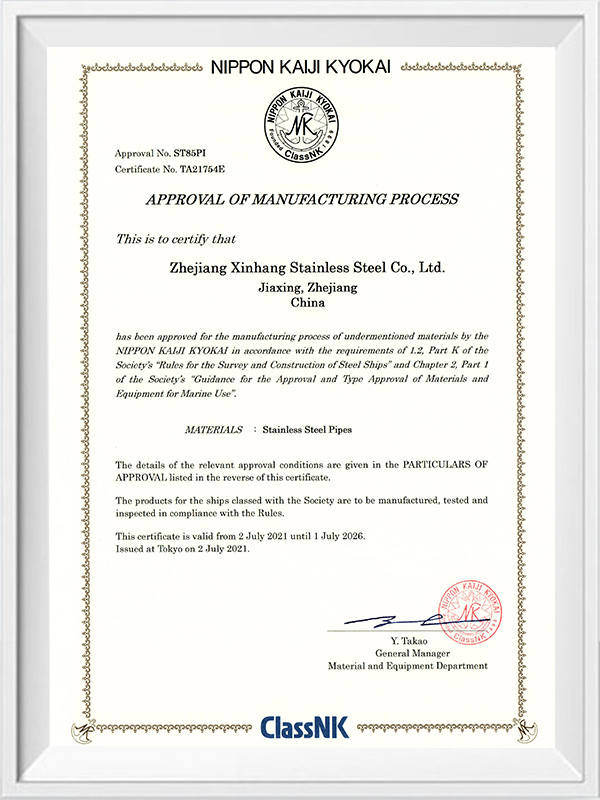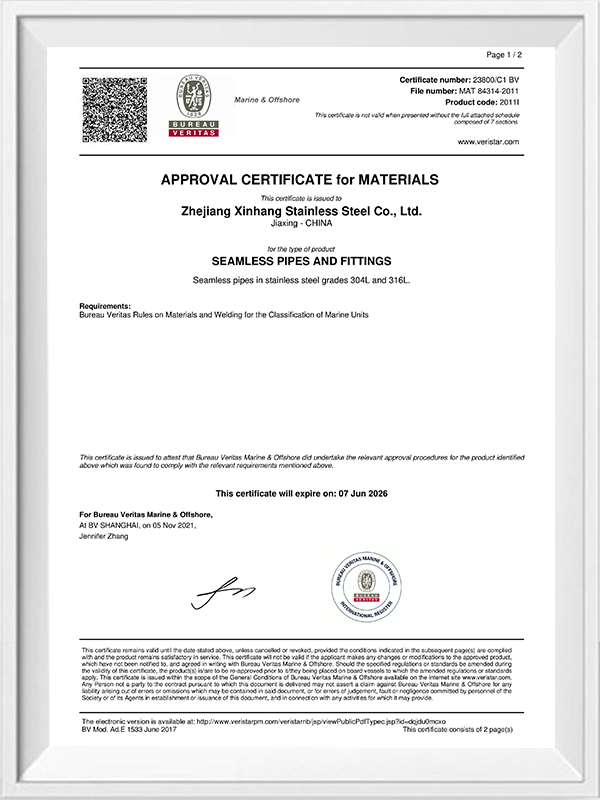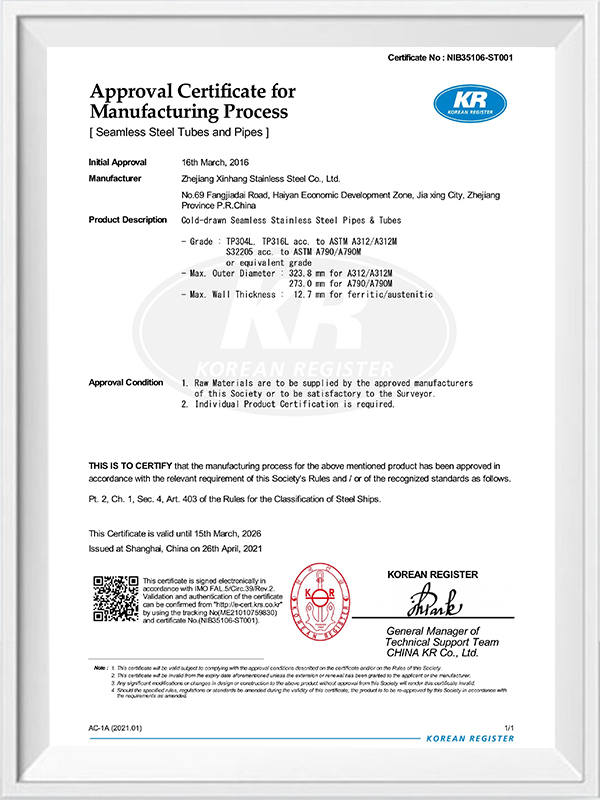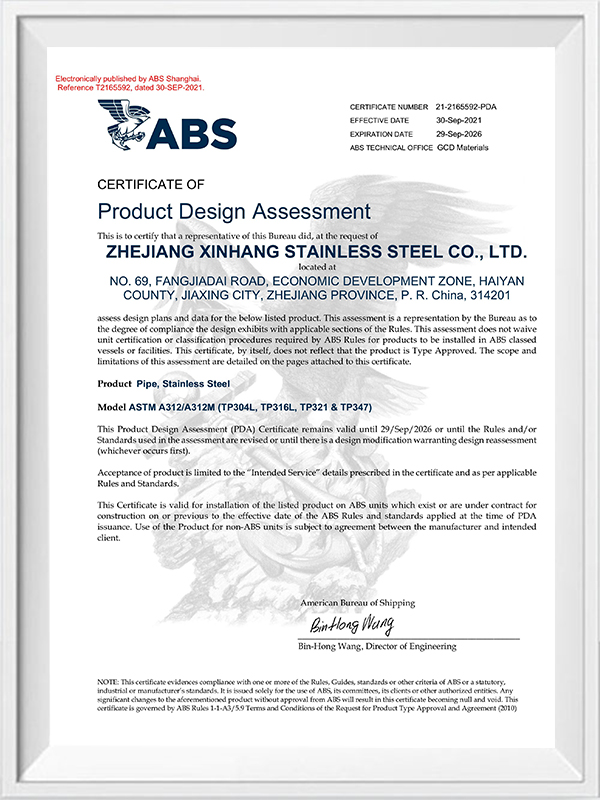

Xinhang Special Material Co., Ltd. Hangzhou Branch is China Stainless Steel chemical pipe Suppliers and Stainless Steel chemical pipe Factory, founded in 2007 and moved to Longyou Economic Development Zone, Zhejiang Province, in 2022. It covers an area of 130,000 square meters, more than 30 production lines, 300 workers, 20 R&D people, 30 inspection people and an annual output of 50,000 tons.
It has passed ISO9001:2008 quality management system, PED 97/23/EC EU Pressure Equipment Directive certification, China Special Equipment Manufacturing License (Pressure Tube) TS certification, ASME certification, provincial enterprise standardization management system, ISO14000:2004 environment management system, cleaner production (green enterprise), and a series of certifications, as well as China Classification Society (CCS), American Bureau of Shipping (ABS), British Register of Shipping (LR), Deutsche Veritas (GL), Bureau Veritas Society (BV), Det Norske Veritas (DNV), and Korean Register of Shipping (KR) factory certification.
The main products include stainless steel pipes, pipe fittings, flanges, valves, etc., which are widely used in petroleum, chemical industry, nuclear industry, smelting, shipbuilding, pharmaceuticals, food, water conservancy, electric power, new energy, mechanical equipment, and other fields. The company adheres to the corporate tenet of "quality for survival, reputation for development" and wholeheartedly serves every customer to create a win-win situation.




Bottom line: how to weld stainless steel pipe without sugar and leaks For most stainless steel pipe work, the most reli...
View MoreDirect answer: what a “stainless steel pipe pressure rating” really means A stainless steel pipe does not have one univ...
View MoreIn our shop, bending stainless steel pipe is one of those operations that looks simple but punishes shortcuts. Stainless...
View MoreWhat SCH 10 stainless steel pipe specifies (and what it doesn’t) In piping specifications, “SCH” (schedule) is shorthan...
View MoreWhat chemicals are commonly transported through stainless steel chemical pipes?
Acids: Various types of acids, including sulfuric acid, hydrochloric acid, nitric acid, acetic acid, and phosphoric acid, are often transported through stainless steel pipes in chemical processing industries.
Alkalis: Caustic soda (sodium hydroxide), potassium hydroxide, and other alkalis are frequently transported in Stainless Steel chemical pipe due to their resistance to alkaline corrosion.
Solvents: Organic solvents such as ethanol, methanol, acetone, and toluene are commonly transported through stainless steel pipes in industries like pharmaceuticals, petrochemicals, and manufacturing.
Chlorine and Chlorinated Compounds: Chlorine gas and chlorinated compounds, including sodium hypochlorite and chlorine dioxide solutions, are often transported through stainless steel pipes in water treatment plants, chemical manufacturing, and disinfection processes.
Water: Stainless steel pipes are widely used for transporting water, including potable water, wastewater, and industrial process water, due to their corrosion resistance and cleanliness.
Hydrocarbons: Various hydrocarbons, such as petroleum products, crude oil, natural gas, and liquid fuels, are transported through stainless steel pipes in refineries, pipelines, and chemical processing plants.
Food and Beverage Products: Stainless steel pipes are commonly used in the food and beverage industry for transporting products like dairy, juices, beer, wine, and edible oils due to their hygiene, corrosion resistance, and non-reactivity.
Pharmaceuticals: Stainless steel pipes are essential for transporting pharmaceutical ingredients, intermediates, and final products in pharmaceutical manufacturing due to their cleanliness, corrosion resistance, and compatibility with pharmaceutical processes.
Specialty Chemicals: Various specialty chemicals, including surfactants, catalysts, resins, and additives, are transported through stainless steel pipes in specialty chemical manufacturing and processing industries.
Inorganic Chemicals: Inorganic chemicals such as ammonia, hydrogen peroxide, sodium carbonate, and potassium sulfate are often transported through stainless steel pipes in chemical manufacturing and industrial processes.
What are the common methods for joining stainless steel chemical pipes?
Welding:TIG (Tungsten Inert Gas) Welding: TIG welding is a commonly used method for joining stainless steel pipes. It offers high precision and control over the welding process, producing strong and durable joints.
MIG (Metal Inert Gas) Welding: MIG welding is another popular method for joining stainless steel pipes. It's faster than TIG welding and suitable for thicker pipes, but may produce less precise welds.
Orbital Welding: Orbital welding is particularly useful for joining stainless steel pipes in high-purity applications or when welding large quantities of pipes with consistent quality.
Threaded Connections:Stainless Steel chemical pipes can be joined using threaded connections, where threads are cut into the pipe ends and fittings are screwed onto them. This method is convenient for assembly and disassembly but may not be suitable for high-pressure or high-temperature applications.
Flanged Connections:Flanged connections involve attaching flanges to the ends of stainless steel pipes and bolting them together using gaskets to create a leak-tight seal. Flanged connections are commonly used for connecting pipes to valves, pumps, and other equipment.
Compression Fittings:Compression fittings are used to join stainless steel pipes by compressing a ferrule or sleeve onto the pipe, creating a seal between the pipe and the fitting. This method is often used for joining small-diameter pipes or for temporary connections.
Press-Fit Connections:Press-fit connections involve using specialized tools to press stainless steel pipes into fittings with an interference fit, creating a secure and leak-tight joint without the need for welding or soldering. This method is quick and clean but requires special equipment.
Brazing and Soldering:Brazing and soldering can be used to join stainless steel pipes by melting a filler metal with a lower melting point than the base metal and allowing it to flow into the joint by capillary action. This method is suitable for joining pipes with dissimilar metals or when welding is not feasible.
Adhesive Bonding:Adhesive bonding involves using specialized adhesives or epoxies to bond stainless steel pipes together. While not as common as other methods, adhesive bonding can be useful for joining pipes in non-critical applications or when welding is not possible.
We'll never share your email address and you
can opt out at any time, we promise.